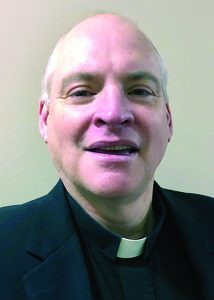An Exodus… An Incarnation
by Robert Mohns

Rev. Robert Mohns
“But to all who did receive Him, who believed in His name, He gave the right to become children of God, who were born, not of blood nor of the will of the flesh nor of the will of man, but of God. And the Word became flesh and dwelt among us, and we have seen his glory, glory as of the only Son from the Father, full of grace and truth.” – John 1:12-14
An exodus happened, and, as shepherds marked time, it happened at the third watch.
I never really paid much attention to the marking of time in Scripture. Exodus 14:24 records the third watch (the morning watch) as the time at which God acted to destroy Pharaoh’s pursuing armies, clogging the chariot wheels in the midst of the sea so they could not move. And God, from the cloud, told Moses to stretch out his hand over the sea that the water might come back upon the Egyptians (Exodus 14:26).
Matthew records Jesus walking out to his disciples in the midst of the storm-tossed sea. It was the fourth watch by Roman standard; but from the Israelite perspective, it was the third. The disciples thought the figure of Jesus was a ghost. But Jesus spoke to them, saying, “Take heart; it is I. Do not be afraid.” And Peter answered him, “Lord, if it is you, command me to come to you on the water.” He said, “Come.” So Peter got out of the boat and walked on the water and came to Jesus. But when he saw the wind, he was afraid, and beginning to sink he cried out, “Lord, save me.” (Matthew 14:27–30)
An exodus took place in the third watch on December 25, 2010. God’s little one left behind this veil of tears to be with her dear heavenly Father and her brother and Saviour, Jesus. Amidst the petitions of that Christmas night—amidst tears and fears and disappointment of a life that would end too early in death—came that ancient petition, “Lord, save.” And the Lord answered his little one’s plea and pulled His Anna from life through death to life.
It happened in the silence of the night on a bed in a front room of home, because there was not enough room for a hospital bed to fit in the bedroom. Two solitary figures in the dark. One remaining, the other now departed. In the early glow of Christ’s Mass, a little flock of sheep made their way to the home, to see if it were true—to bring the comfort of their presence, their mourning, their prayers, and the reminders of God’s promises to all who die in the faith, filled with love and with hope.
All of this happened because one day there came an entrance into the world. It too happened in the watches of the night in a place outside of the common living area because there was no room for the Holy Family and for the Holy One to lay his head. John, the evangelist writes of this entrance of Jesus saying, “And the Word became flesh and dwelt among us, and we have seen his glory, glory as of the only Son from the Father, full of grace and truth” (John 1:14).
This is the Apostolic testimony concerning the incarnation. St. John lays out the great comfort for us, writing, “But to all who did receive him, who believed in his name, he gave the right to become children of God, who were born, not of blood nor of the will of the flesh nor of the will of man, but of God” (John 1:12-13).
God, who assumed human flesh, lived to die and died to live in order to bring his little ones through death to life. Here is comfort and peace and joy for all those who have known death, and perhaps are even experiencing it in a very profound way today. Christmas, the Festival of the Nativity of our Lord, signifies for us that Immanuel—”God with us”—has come to save His people from sin and death. His coming then, now, and in our future is the fulfillment of God’s will to save His people. It is the fulfillment of our prayers, our pleadings in that dark watch of the night, in that valley of death, when death does its worst and our flesh trembles for fear. “God, Save!”
God, who assumed human flesh, lived to die and died to live in order to bring his little ones through death to life. Here is comfort and peace and joy for all those who have known death, and perhaps are even experiencing it in a very profound way today.
I find myself at a loss for words to convey the significance the great mystery of the incarnation had for me as I experienced the death of my wife.
The Veni Redemptory Gentium, “Come Redeemer of the Nations,” has been sung in the Liturgy of the Hours for almost 1,700 years. It captures the incarnation. It is so profound a hymn that Martin Luther translated it into German in 1524 for the people to sing during the dark night of the great plagues. Translated into English for us, we join with the saints to sing the great mystery. Verses 4 and 5 have been of such great comfort to me.
From the Father forth He came And returneth to the same,
Captive leading death and hell—High the song of triumph swell!
Thou the Father’s only Son, Hast o’er sin the victory won
Boundless shall Thy Kingdom be; When shall we its glories see?
———————
Rev. Robert Mohns is Regional Pastor for Lutheran Church–Canada’s West Region.




